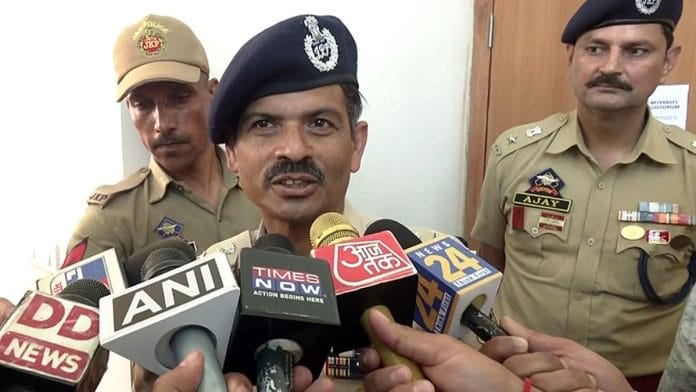New Delhi: From advocating for the dismissal of government employees with any links to separatism or militancy in order to “dismantle the terror ecosystem”, to cracking down on lawyers, and now triggering a row by accusing mainstream, regional political parties in the Valley of aiding Pakistan’s infiltration into civil society, Jammu & Kashmir Director General of Police (DGP) Rashmi Ranjan Swain is not new to controversies.
He is often described as a “resolute officer” dedicated to rooting out terror from within the system, leading the fight against terror financing, narco-terrorism, and identifying and taking action against individuals undermining the system from within.
A 1991-batch IPS officer of the erstwhile J&K cadre, now AGMUT (Arunachal Pradesh-Goa-Mizoram and Union Territory), Swain, who is from Odisha, was on central deputation in the Research and Analysis Wing for 15 years and returned to J&K in 2020, a year after the abrogation of Article 370, as additional director general of the J&K Police’s Criminal Investigation Department (CID).
He is currently the acting DGP of J&K.
In his service, Swain has served in sensitive posts in J&K, including as senior superintendent of police (SSP) in Srinagar, Poonch, Leh, Ramban and Jammu. He also served in the J&K Vigilance Commission.
His politically charged comments about regional mainstream parties cultivating leaders of terrorist networks have led to a sharp reaction from politicians, including former J&K chief ministers Mehbooba Mufti and Omar Abdullah, who accused the officer of “fixing things politically”.
National Conference (NC) vice president Omar Abdullah Wednesday asked DGP Swain to “leave politics to politicians”, according to reports.
“Leave politics to politicians. The DGP sahib is stepping into politics. His job is to improve the situation and control militancy, especially in Jammu. We wanted to hear about that. We cannot oversee law and order or secure borders. We cannot fight militancy, even though we have sacrificed a lot. We can only raise our voices. It’s the DGP’s job to fight militancy,” Abdullah said.
Referring to the encounter in Doda district Monday in which four Army personnel were killed, Mufti said, “What has happened in Doda is highly condemnable. We lost our brave soldiers and officers in this attack… There is no accountability. The incumbent DGP is more busy fixing things politically.” She called for his sacking.
“We do not need a ‘fixer’ here, we need a DGP… No one worked on communal lines, but today it is done on communal lines. Employees are being sacked on charges of corruption. Most of them are from the majority community.”
Also read: ‘Told EC we’re ready’ — after Abdullah, Azad, BJP’s J&K unit endorses simultaneous polls
‘Powerful officer, extreme but tough’
A senior J&K police officer told ThePrint that Swain has worked towards keeping the militant network in check. “He is among one of the most powerful officers in the Valley. Following the abrogation of Article 370, when he was the CID chief, he worked towards maintaining peace in the Valley and kept the separatists and militant network in check.”
He added, “His policies may come across extreme or tough, but that is what was required in the Valley and the results are for everyone to see.”
A second officer told ThePrint that Swain understands J&K and where the problem lies, which is why he was chosen by the central government to come back to Kashmir from RAW after the abrogation of Article 370.
“Whether it is the NIA’s case on terror funding, or against institutions like the J&K Bank or the case in which MBBS seats were sold to generate terror money, Swain assisted all the agencies for these investigations. He knew that the root cause is within the system and he worked to clean that up. This is the only solution for long-term peace,” the officer said.
A committee was constituted in July 2020 under Swain for scrutinising inputs, records and cognisable material against government employees, which led to the dismissals. As many as 57 government employees, including a college principal, professors, a public relations officer of Kashmir University, police personnel, and doctors, have been sacked in the past two years for allegedly “supporting militant activities”.
The 57 employees include two sons of Hizbul Mujahideen chief Syed Salahuddin. One of them — Syed Ahmad Shakeel — was working at the Srinagar-based Sher-e-Kashmir Institute of Medical Sciences, and the other — Shahid Yousuf — was posted at the Jammu-based Sher-e-Kashmir University of Agricultural Sciences & Technology.
The designated J&K committee that is responsible for scrutinising and recommending cases under Article 311 of the Constitution, which pertains to the “dismissal, removal or reduction in rank of persons employed in civil capacities under the Union or a state”, decided to sack the 57 employees.
The dismissals were under Article 311(2)(c), which allows action without an inquiry.
(Edited by Radifah Kabir)






